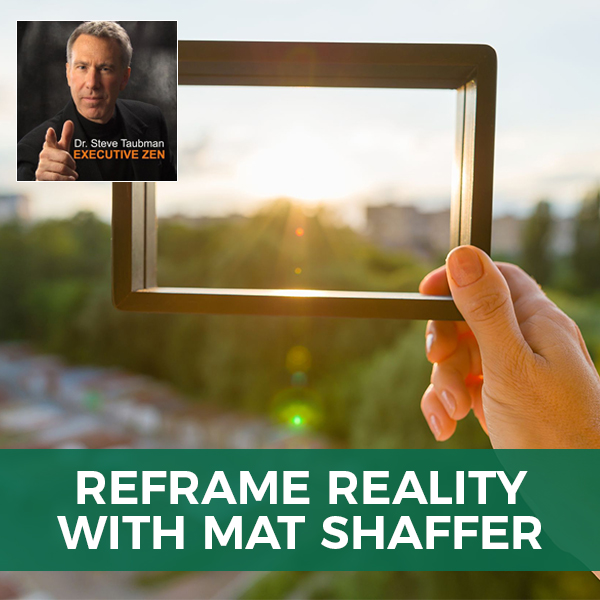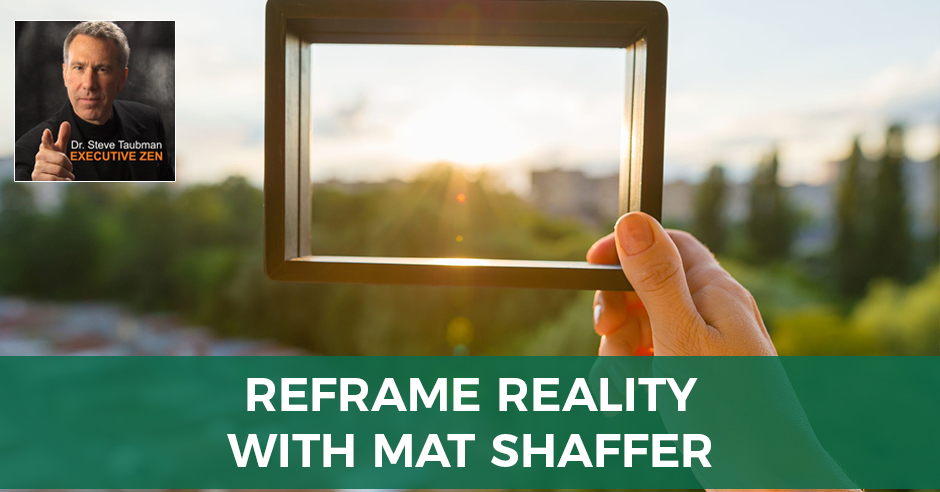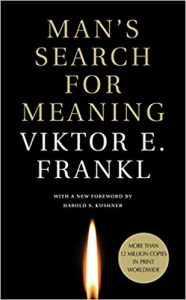

We all think a certain way, and we think that the way we think is the right way to think. The reality of the matter is that in almost any situation in your life, there are ways you can shift the way you look at it and in doing so, shift the results that you get. In this episode, I’m joined by life coach and transformational speaker, Mat Shaffer. This is a lively and upbeat conversation about the power of the mind and its ability to choose empowering ways of looking at circumstances which lead to better outcomes. Reframing reality is a huge concept that we talk a lot about in the work that I and Mat do, and that’s going to be a big part of our topic. Great show!
—
Watch the episode here:
Listen to the podcast here:
Reframe Reality with Mat Shaffer
I’m particularly excited about our topic, which is reframing reality. Reframing is a huge concept that we talk a lot about in the work that I do and the work of my guest. That’s going to be a big part of our topic. I learned about reframing first from Tony Robbins when I did the fire walk with him way back before anybody else knew who he was. I had about 150 people in the room with me and Tony Robbins. We walked on hot coals together. It was profound and since then, I’ve continued to learn more about this through my training in hypnosis and my training in NLP.
Our guest, Mat Shaffer, is an expert in this area. If you are an entrepreneur or a small business owner, you can get a lot out of his mindset mastery of this that I’m sure is going to rock your world. First, I want to provide a little context. I’ve been swimming around the water about reframing for a long time and hypnosis is one of the tools that we use to help people to reframe or to reconceive their reality, to see things differently, to get a different sense of what’s true for them, so they don’t immediately default to their habitual way of thinking about things. We all think of a certain way and we think the way we think is the right way to think. The reality of the matter is that in almost any situation in your life, there are ways you can shift the way you look at it and in doing so, shift the results that you get.
I was on the Jenny McCarthy Show. It’s a great honor to be a guest of hers. When I was there, I made an offer to her audience. What I did was I created a webpage to let people get a free sample of my newest book, Buddha in the Trenches. I didn’t take the page down, so it’s accessible as long as you know where to find it. I’m going to invite everybody to take a moment when you get a chance and go to my website, SteveTaubman.com/jenny. That will give you access to a page where you can download a free copy the first 30 pages of my book, and also access to the Mindfulness Quiz. That’s an important thing to get ahold of.
Back to reframing, we see things a certain way. We think that they are that way. In my work as a hypnotist, I’ve had the delight to watch people instantly reframe things in their lives. I’ll tell you one story and then I’m going to bring Mat on with me. In my hypnosis show, the way that we do it is that we spend a little time at the very beginning, putting people in hypnosis. We talk a little bit, we bring people up, we get volunteers and then we go through an induction where we induce people into hypnosis. In this particular case, I was doing a hypnosis show and I was doing it on a gym floor in a big gym.
Once you create a new vision for what you want your life to look like, you get to start adopting beliefs that are in alignment with that. Click To TweetThere was a janitor pushing this big tray of giant metal folding chairs across the floor of the gym in the middle of my induction. Right in the middle of putting people into hypnosis, the chairs fell over and exploded on the floor. Huge, loud, rocket of a sound hit the ground. All these people, I have been saying, “You’d get quieter and you breathe more slowly and more calmly, you start to become more and more peaceful,” then this huge explosive sound. Without skipping a beat I said, “As you hear the sound, the loud sound around you, it takes you even deeper into hypnosis,” and they did. They did go deeper. The moral of the story is that when we hear a loud sound, our natural default mechanism is to think that’s disturbing, but is it? Is it an interpretation we’ve made? Is it possible that we could completely change the way we look at things that are even uncomfortable, unpleasant experiences, the things that we’re averse to? Loud noise, bad smells, whatever it is and boring teachers. Can we reframe those situations in such a way that we get value from the experience and even use it to propel us to a higher level?
That’s what I’m curious to talk to Mat about. I am super excited about this show. Mat Shaffer is a transformational speaker and coach who inspires others to step into the infinite possibilities waiting on the other side of their limiting fears and false beliefs. He draws upon his undeniable passion for transformation and remarkable personal journey to shift audiences worldwide. He spent over a decade as a successful trial attorney and restaurant owner before a series of profound shifts led him to embrace his calling to teach, inspire and coach entrepreneurs, business owners and sales professionals growing to their full potential. Mat has served thousands, speaking online and on stage sharing his emotional intelligence insights, personal development perspective and lessons learned along leadership. He’s a great speaker who graces stages at corporate events, motivational conferences and team building workshops. In fact, Mat and I will be sharing the stage very soon for the world-famous Habitude Warrior Conference in Washington, DC.
On a personal note, I got to meet Mat over dinner with Mr. Awesome himself, Erik Swanson, who has also been a guest on Executive Zen, a great guy and a true leader. I knew instantly from our conversation that you were somebody I wanted to know. With all the great speakers and thought leaders I work with, that you were a standout and that we resonated philosophically. Mat, welcome to the show and we are ready to rock and roll.
It’s good to be with you, Steve. I love the way your mind works. I love your content and what you’re up to in the world. I’m excited to talk about reframing reality and what’s possible for us in our lives if we can do that effectively.

Reframe Reality: We could completely change the way we look at things that are uncomfortable and unpleasant experiences and reframe them in such a way that we get value from the experience.
We’re talking about reframing. Reframing is a concept that a lot of people aren’t that familiar with. A vital part of the work we do as coaches, as teachers, as speakers, is helping people to understand that their interpretation of reality isn’t the sum total of reality. You heard me do my pre-ramble before I got everybody else on board and before I get you onboard. Feel free to correct me.
I agree with everything you said and what it starts off with is the concept of context and interpretation. We operate out from a context. There’s a context in which everything is coming into our lives and that context as far as I’m concerned is the beliefs that we’ve created consciously and subconsciously. The context is like the lens through which everything comes in. An event happens to you. For example, you go on a date and the person shows up twenty minutes late and the context that you’re operating from is your father was chronically late because he was having an affair with somebody or he was emotionally checked out from you. The context you’re operating from is that when people are late, it’s an indication that they’re selfish and they don’t care about you and it’s a sign that they’re a bad person or whatever. Then you have an interpretation.
There’s the context, which is the background of your life that everything’s coming in from and then the interpretation is the story that you create about it. Then your interpretation of that event is going to be that this person is a selfish piece of crap and he’s not worth your time and he’s dangerous and this, that and the other. You have context and then you have your interpretation and then you have the behavior that you do base upon your interpretation. The first part of reframing is to recognize the context through, which you’re taking in all your information and being willing to let go with that. If you can’t, you’re never going to be able to shift the interpretation of the things that are happening in your life.
First of all, people are reluctant to take responsibility for their own context because they’re so used to living inside of it. It becomes the water to the fish. The fish is swimming all around me, but I don’t see any water. Where’s the water? There’s no water around me. I believe they’re all around me. My interpretations are all around me but I don’t see them. All I see is that jerk who showed up late. The entire experience is 100% an external responsibility. It’s something that somebody else did to me that created this experience for me and I’ve got no breathing room. If I’m not sufficiently mindful of my responsibility, then I’m completely powerless. Then I’m completely at the effect of everything else. I’m a victim of the world and I could live in the complete state of victimhood thinking that I’m powerful. You could have a delusion to think, “I’m powerful, I’m cool,” but you’re letting the experiences dictate your reality based on all the context you’re bringing to it.
Beliefs can be like bars on a cell. They can shut us down. Click To TweetThe thing that you said there that I like was connecting the concept of personal power with the concept of context and interpretation. This is something that is highlighted in one of my favorite books, Man’s Search for Meaning by Viktor Frankl. Our ultimate power is our ability to choose our context and our interpretation for our lives. We have a choice. We feel that we’re the fish in the water and we can’t see the water, but we have a choice every day. About the context that we choose to operate from and the interpretations that we choose to make around our life. We can’t change anything else. We cannot change, for the most part, the stuff that’s happening around us, but we can always choose how to interpret it and to change the context through which we see everything. What happened to us in the past, we can’t change that but we can choose how we change to look at it and that’s the basis of reframing.
You remind me of the Gurdjieff quote where it says, “The first step for escaping from prison is knowing that you’re in prison.” We are imprisoned by our context. If we don’t take ownership of it, if we don’t take mastery of it, if we don’t allow ourselves to escape from the one interpretation I’m making about this, this person is lazy, that person is a pain in the butt. We’ve got this entire set of beliefs about everything that’s going on around us and the content can be interpreted through any number of lenses. As long as seeing the content and context through this frame. Context and frame are essentially the same things.
I’m looking at it through this context. I’m seeing it through this frame, I’m the one who is living inside of this frame. I believe in this frame therefore, I’m putting everything that happens to me through that frame. Therefore, I’m having these results and I don’t know I’m doing it. I don’t know that I’m in jail because I liked the visual of that. You think of a frame, it’s almost like it’s a jail cell. How do you start helping people experience the dawn of awareness? Like, “My life is stressful and maybe it’s not the content of my life that’s causing the stress, maybe it’s the context or the frame.”
I work as a Senior Trainer for Habitude Warrior International and I’m blessed to be facilitating workshops with these concepts all over the country. I also work as a private coach for people. The first step that I do go through with all of my clients is to help them understand and cultivate the self-awareness around their context and their stories. What’s the context from what you’re operating and what stories have you constructed around the people and events of your life? Once you have that initial awareness, you’ve already disengaged from them a little bit. They’re no longer just your reality. They’re these constructs that we can work with like good friend’s asking, “How do we unlearn our beliefs?”
The way to unlearn them is by consciously choosing ones that are in alignment with who you want to be, where you want to be, and what you want to create in your life. Once you acknowledge and you identify all this crap and you have to admit to yourself that it’s not working for you, then you say, “This isn’t working for me. What would work for me?” What would my life look like if I had everything that I truly didn’t want? What will my life look like if I let go of the belief that all men are scum or that I have to struggle to be successful or life has to be hard? I have to be broke. Being rich is for bad people. What would my life look like if I let go of all those stories and fostered and created a life that I wanted?
Once you create a new vision for what you want your life to look like, then you get to start adopting and choosing beliefs that are in alignment with that, unless you chart a new course, unless you pick a new target and get out of that autopilot. We haven’t chosen a lot of our beliefs and a lot of our context. Like good friends are talking about our beliefs, this stuff that we’ve accumulated and we haven’t even realized that we’ve internalized it all. You shut down the autopilot, you pick a different and then you started adopting beliefs. I’m not going to say it doesn’t take time. This is deep work and it takes a lot of time and a lot of them are profound if you can do the work and heal your stuff.

Reframe Reality: You got to be careful about the beliefs that you choose and make sure they don’t lock you in as you’re adopting new ones.
What that brings to me are two things. First of all, there’s time and there’s effort and there’s courage. Courage is a big part of this because you have to be willing to challenge your own usual way of looking at things and also be able to face all the ways in which your old interpretations have created your reality, like, “How much harm have I put it in the world? How much damage have I done in the world by being intolerant or by being impatient?” To see it and be present to it, that’s not fun. Our default is to accept the way it is.
In my own personal journey, we get addicted to these toxic patterns that we run in our head. We get addicted to them, we get dependent on them. Something I realized when I started doing my own deep inner work was that I had become addicted to my pain. I have become addicted to the story of how they would have killed anybody else. I was predicating my self-worth overcoming the suffering that I had overcome in my life, but I wasn’t looking ahead and being like, “What would my life look like if I wasn’t suffering?” I was preoccupied with feeling a sense of worth overcome which was creating a dependency on that suffering that I had overcome. It was weird.
A big part of me was letting go. I’m not defined by the fact that I overcame drug addiction or the fact that I walked away from being a lawyer and walked away from a restaurant. That doesn’t define me. It’s part of my process, but it isn’t who I am. Who I am is what I want to create moving forward. That shift in perspective from being defined by my past to being defined by what I choose to create moving forward. That was for me, the reframe that shaped the rest of my life to this point.
Give yourself room for new experiences and new beliefs to come in. Click To TweetI could absolutely relate to that. That’s been my journey too. It’s the willingness to let go of the past, being willing to embrace the future, to not define myself by the way I’ve defined myself and what you said that was so powerful is it’s an addiction. We get addicted to our own view of who we are. It’s like I’ve always been this. I did a talk for the Obesity Medicine Association and these were doctors who deal with patients with obesity. I was talking about the mindful practitioner and mindful eating. The challenge that people face who are chronically overweight or chronically have poor impulse control and things like that and the thoughts and the voices in their own head about I could never be thin, this is who I am. Whenever you say, “This is who I am,” that’s a red flag. It’s never, “This is who I am,” unless you decide to let that be who you are. It’s never that easy, but being responsible enough to say, “I can change, I can face some of the discomforts I’m going to feel when I do change.” That’s where it happens because there’s always discomfort. If you’re an alcoholic, you’re going to have withdrawals from it before you feel freedom. Your choices are if I don’t want to feel miserable, I can keep drinking because if I keep drinking, I’ll never have to face the pain of not drinking, but that’s a temporary thing.
They take the devil they know than the devil they don’t. It’s one of those mind-blowing things that if we can let go of all the things we thought we believed about who we are and what we’re here to create. What’s possible for us and what’s not possible for us and we adopt new beliefs that are open-ended, because this is the other thing about beliefs is that they can be like bars on a cell. Your beliefs can shut us down. How about instead of allowing our beliefs to pigeonhole us like I can make X amount of money, we adopt a belief that there are possibilities available to us that we can’t even comprehend.
I couldn’t have comprehended the life that I have now five years ago. I couldn’t have adopted a belief, like a closed belief that was encompassing it. I had been setting concrete, like this is who I am and this is what I do. I made a choice. I said I want to change the world using the power of my voice and my experiences. By reframing and setting a broad, powerful intention over who I was and what I wanted to create in the world, I didn’t lock myself in because I don’t think we’re capable of understanding what’s possible for us consciously. We can at a higher level, but I don’t think our conscious minds are capable of understanding the possibilities available to us. You’ve got to be careful about the beliefs that you choose to do that. Make sure they don’t lock you in as you’re adopting new ones.
There are a couple of things. First of all, the idea that our beliefs are not fixed or our beliefs are not in and of themselves real. The first belief we need to change is the belief that our beliefs are real. First, you have to believe that it’s possible to change your beliefs in order to take the next step. That’s the first thing is our beliefs are not fixed. I’ve at least adapted to the belief that maybe my reality isn’t exactly the way it is. Maybe I can choose new beliefs. The second thing is what does it take to change your beliefs? If I’ve been believing this all this time and I’m aware that my life isn’t going the way I want it to go. I’m willing to accept at least provisionally the idea that maybe the reason it’s not going the way I wanted to go is because of those beliefs. It’s not content.
The more work you do, the deeper you go, and the greater things open up. Click To TweetFix the mood before you fix the mess, fix the inner stuff before you fix the outer stuff. I can believe that then, now I’ve got to change my belief. The thing is, “How do I change my beliefs?” My beliefs are sustained by my evidence. My evidence is sustained by my beliefs. It’s mind-boggling. That doesn’t take into account the fact that the reason that I see it the way I see it is because of the belief. All men are bad. All men have been bad all my life, but it’s true because all men really have been bad to me all my life, but is it possible that all men are bad? Which came first, the chicken and the egg? Is it possible to get off that merry-go-round? That if you literally have a different belief, would you have a different experience?
When we have those beliefs, we’re consciously or subconsciously going to seek experiences to prove ourselves right. Our ego is continuously looking for ways to validate the beliefs that keep you at the place that you’re at. We’re fundamentally resistant to change. Being willing to let go of all that stuff and step through our fears into a space of possibility is the only way to truly transform. That’s a process that requires courage to face your fears, courage to step through them. It requires hard work and consistency because sometimes this crap is very deeply ingrained in our head.
When I first started identifying and unpacking my beliefs, they were rattling around in my head thousands of times a day. I’d have to stop 100 times and acknowledge that is not true. I thought at 30 coming out of my restaurant that I was a failure and that my life was over and that I was done at 31. A failed career as a lawyer, failed restaurant owner. Even though I walked away willingly from both of those things, I made up a story that I was a failure and then I was done. It took me months to un-program that belief but as I did, new opportunities opened up to me. That’s the process. As you let go of these things, new things come in. You’ve got to create space for them to occur or else they’re not going to be able to materialize for you. Give yourself room for new experiences and new beliefs to come in, stopping the old ones.
Don’t believe everything you think because that’s where we get lost. Humility is part of this also. I’ve got to be having the humility to say because that idea popped into my head, just because I’m a failure, it doesn’t mean I’m a failure. It means that I’m used to telling myself I am that, but don’t believe everything you think. The commitment, the willingness to say maybe I’ve been looking at this all wrong, it is the first step toward changing beliefs. Just the willingness to provisionally, “Maybe I’m wrong, what if I’m wrong? What if this thing I’ve been saying to myself isn’t true?” The ‘what if, the question mark’ is a great place to start.

Reframe Reality; What’s available for you on the other side of all of your stuff is more profound than anything you can possibly imagine.
I’m a hypnotist and I do a lot of trance. I work around the subconscious mind where our beliefs live. If you want to change your beliefs, there are three tried and true ways of getting rid of negative beliefs. One of them is affirmations. You keep repeating a positive statement to yourself until you believe it. The problem with that is that you’re pushing an uphill battle. Every time you say something good to yourself like, “I’m good enough. I’m smart enough and people liked me.”
What’s interesting about that is that if we try to say, “I’m a millionaire,” but you’re dead broke, then the charge behind that thought, the charge behind that mantra or whatever is going to be negative. It’s going to have the opposite effect. It’s going to repel you from what it is that you’re trying to create. That’s why you got to get a deeper understanding of I am in scarcity.
I appreciate the wisdom that you bring into the conversation. We’re talking about recognizing context. Recognizing that the frame you’re holding things in has an impact on what you see and how you see it and then what you do as a result and how successful you are. The idea that first, you’ve got to wake up to that fact that before you could get out of prison, you have to know you’re in prison. You have to realize that you’ve got responsibility for the way you’re seeing things. If you do know that, then you are changing your beliefs. Most definitely you and I plan a time to do this again, but what I’d like to leave with it is to talk a little bit about how exciting it is to do this.
I’m very aware of the fact that suggesting to somebody that if your life isn’t working for you, that you’re responsible for that, that you could change your beliefs. That means a certain amount of work and a certain amount of courage and a certain amount of humility and a certain amount of practice. That’s true, whether you like it or not. That may sound like, “I’ve got enough crap going on in my life. Do I also need to have to be responsible for it?” What I want to echo here and what I’d like to leave us with is how awesome that ultimately is. How amazing it is that you get to do this, that you get to have the responsibility for yourself. Talk about that. What does it ultimately look like?
I can say this for me personally and also through the people that I’ve worked with, what existed on the other side of all of my fears and all of my stories and all of my contexts that I created about who I am and what I was capable of. It is more exciting, more fulfilling, more expansive and greater than anything that I could have possibly imagined. What’s available for you on the other side of all of your stuff is more profound than anything you can possibly imagine. The cool part is that the more work you do, the deeper you go and the greater things open up. Even now with years of work and years of layers that I peeled away, I still feel like I haven’t even scratched the surface of my life. It is not fun at first for most of us. It’s very painful for us to let go of these beliefs and context and interpretations that we’ve become addicted to, literally like heroin addicts.

Man’s Search for Meaning
It’s our comfort zone and we’re prisoners of it. What’s possible for us on the other side is so beautiful, that it is worth the discomfort and the tears and the release and the surrender of all the things that we thought we were. It’s worth it. There’s such beauty waiting for you on the other side of that. I invite all of you to jump into the process and start doing work. Read Man’s Search For Meaning by Viktor Frankl. If I were to do a challenge, I know Steve likes his guests to do a challenge. My challenge for you this week is to get the book, Man’s Search for Meaning by Viktor Frankl. Read it and take two or three takeaways that you’re going to adopt into your life and the principles in it will transform your life. It’s a short book. It’s an easy read. It’s one of the most important that exists that’s ever been written in the 20th Century. That’s my challenge for you.
Our quote for the day, “Every problem is a gift. Without problems, we would not grow.” Tony Robbins said that. I thank you all for being part of this. I also want to suggest to keep the metaphor of the frame. We talked about the frame. Live your life, understanding that you’re carrying a frame around with you and take responsibility for moving that frame in different places. If you’re not getting the results that you wanted and your perception of life isn’t serving you, reframe that reality. Change the way you see it. Mat, how can people reach you?
There are a couple of different ways. My website is MatShaffer.com is a great way. I am accepting probably maybe one or two more personal coaching clients right now basically for the next twelve months. If you ever wanted an opportunity to work with me, I’m very good at helping people make shift happen in their lives. That’s my passion. That’s what I’m about. If you’re ready for change, talk to me and let’s talk about what it looks like. Also Habitude Warrior International. We do incredible workshops all over the country. We’re doing one in Washington, DC.
Steve and I will be on stage there. That’s going to be amazing. That’s going to be at the end of October. Go to HabitudeWarrior.com. You can check us out there. We’re also going to be in Houston. It’s going to be huge. If you’re in Texas, if you want to come to check us out, we’re going to have a beautiful event in Houston in November. Check us out. Let us know. If you’re a speaker, we’d love to have possibly explore what it would look like to have you on our stages as well. We’re always looking for new incredible speakers. We’d love to connect with you.
Mat, thanks so much. I appreciate your time and your wisdom. It’s been a lot of fun. Ladies and gentlemen, share this story with your friends. Subscribe to my podcast. Visit me at iTunes, find my channel Executive Zen. Remember to lead consciously and profit responsively.
Important Links:
- Mat Shaffer
- SteveTaubman.com/jenny
- Habitude Warrior Conference
- Erik Swanson – previous episode
- Man’s Search for Meaning
- Habitude Warrior International
- Obesity Medicine Association
- HabitudeWarrior.com
- Executive Zen on iTunes
- http://www.MatShaffer.com/
About Mat Shaffer

Mat Shaffer is a transformational speaker and coach who inspires others to step into the infinite possibilities waiting on the other side of their limiting fears and false beliefs. Mat draws upon his undeniable passion for transformation and remarkable personal journey to shift audiences worldwide. He spent over a decade as a successful trial attorney and restaurant owner before a series of profound shift led him to embrace his calling to teach, inspire, and coach entrepreneurs, business owners, and sales professionals in growing to their full potential.
Mat serves thousands speaking online and on stage sharing his emotional intelligence insight, personal development perspective, and lessons learned along the leadership path. Among his many credits is lead trainer and conference MC for the world famous Habitude Warrior Conference.